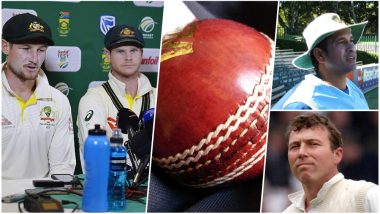The cricketing world has come to a standstill ever since Steve Smith, the 28-year-old captain of Australian cricket team admitted of his side involvement in ball-tampering scandal against South Africa. Rookie Aussie opening batsman Cameron Bancroft was the one who tampered the ball on third day of the South Africa vs Australia Third Test match played at Newlands, Cape Town. Bancroft ball tampering video was the proof of devious plan hatched by the senior members of the team or like Steven Smith calls them as his ‘leadership group’! Steve Smith and Cameron Bancroft have stirred the age-old ball-tampering history afresh that saw the likes of superstar cricketers Sachin Tendulkar, Faf du Plessis, Michael Atherton, Stuart Broad and more accused of meddling with the ball illegally.
In 2018, Smith went down from being crowned Test Player of the Year to become the most despised (and stupid) sportsperson. Despite Bancroft being directly involved with ball tampering, the onus fell, and rightly so on Smith as the scandal took place under his watch. The ball-tampering incident has exposed Australian cricket side as cheats but more so turned them into a laughing stock of cricket, believes Aussie wicketkeeper-batsman legend Adam Gilchrist.
With the matter escalating so much so that Australian government stepped into demanding Steve Smith’s removal as captain. The road looks long ahead for Steve Smith, who has stepped down as the captain along with vice-captain Steve Smith in the ongoing Test series against South Africa as of now. While the International Cricket Council (ICC) has handed Smith a one-match ban and fined 100 percent match fee, Smithy’s future both in international cricket and upcoming Indian Premier League (IPL), country’s flagship domestic cricket tournament remains in uncertainty. Today, we take a look at few key information about ball-tampering, its history and high-profile examples.
What is Ball-Tampering? What is ICC’s Law on Ball-Tampering?
Ball tampering is an act by the fielder to interfere with the aerodynamics of the ball. By official definition, Ball Tampering is described as “Under Law 41, subsection 3 of the Laws of Cricket, the ball may be polished without the use of an artificial substance, may be dried with a towel if it is wet, and have mud removed from it under supervision; all other actions which alter the condition of the ball are illegal. These are usually taken to include rubbing the ball on the ground, scuffing with a fingernail or other sharp object, or tampering with the seam of the ball.” The purpose of ball-tampering is a no-brainer with the individual cricketer altering the condition of a ball to achieve more favourable bowling conditions.
According to ICC Standard Test Match Playing Conditions, players are barred, by Law 42.3, from rubbing the ball on the ground, interfering with its seam or surface, or using any implement that can alter the condition of the ball to thereby gain an unfair advantage.
What Are Various Methods of Ball Tampering?
Cameron Bancroft was caught by television videos using a foreign yellow object, later confirmed to be sticky yellow tape, which he used to illegally scuff the ball. He later hid the material down the front of his trousers and showed a piece of cloth to suspicious on-field umpires. His idea of using a tape to scrape the ball has earned the whole scandal the name Sandpaper Gate. On other occasions, accused fielders have used lip balm to saliva to be rubbing the ball against a rough surface to picking at the seam of the ball with fingernail, all have been indigenous ideas to tamper the ball.
Infamous Cases of Ball Tampering in Cricket History
1. England’s Michael Atherton in 1994 Against South Africa
During the first Test match against South Africa at Lord's, Mike Atherton was caught by television cameras of reaching into his pocket and then rubbing the substance on the ball. This ball-tampering act therefore is also known as "dirt in pocket" affair. Atherton was not only guilty of illegally altering the ball condition but further lying to match referee Peter Burge upon being questioned. He was charged £2,000 for carrying dirt in the pocket and lying to the match referee.
2. India’s Sachin Tendulkar in 2001 Against South Africa
TV close-ups caught the God of Cricket, India’s biggest cricketing icon Sachin Tendulkar tampering with the seam of the ball. While Sachin maintained he was removing a grass stuck in the ball, match referee Mike Denness of Scotland suspended Tendulkar for alleged scuffing in South Africa Test. His decision led to a massive outrage by both Indian cricket team as well as fans after which the final match was played but declared as an 'unofficial Test'. Later, Sachin Tendulkar was cleared of ball-tampering charged by the ICC.
3. South Africa’s Faf du Plessis in 2013 Against Pakistan
South African player Faf du Plessis was caught rubbing the ball on his trouser zip, in an apparent attempt to tamper with the ball. Television replays showed him ball tampering during the second Test against Pakistan in Dubai. Under International Cricket Council (ICC) rule 42.1 on tampering, Pakistan were awarded five penalty runs and replaced the ball.
4. South Africa’s Faf du Plessis in 2016 Against Australia
Du Plessis was again found to be guilty of ball tampering only this time around as South African captain. He was charged with ball tampering in the second Test against Australia in Hobart. Faf du Plessis was found using saliva from mints to scuff the ball. Though he was cleared of playing the next Test, he was fined his match fee from the second Test.
5. England’s Stuart Broad and James Anderson in 2010 Against South Africa
On Bancroft and Australia’s ball-tampering scandal, England pacer Stuart Broad branded the Australians as hypocrites, but he seemed to forget his own wrongdoing in the past. In 2010 bowlers Stuart Broad and James Anderson were accused of ball tampering by rubbing the ball on the ground with their spikes in the third Test Match against South Africa. They got away without being pressed with any charges or punishments, but the world did get to see their illegal act.
Steve Smith has admitted to making a ‘big mistake’ (after the ‘brain fade’ match) after getting too desperate of registering a win at any cost. However, with his side exposed, the cost of his erroneous act seems gargantuan. It will take a lot of damage control both on part of Cricket Australia and Steve Smith at a personal level to diminish the effects of a mighty crime – denting the spirit of cricket.
(The above story first appeared on LatestLY on Mar 25, 2018 09:21 PM IST. For more news and updates on politics, world, sports, entertainment and lifestyle, log on to our website latestly.com).













 Quickly
Quickly


